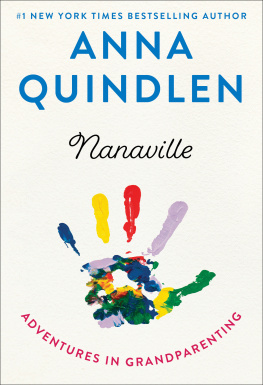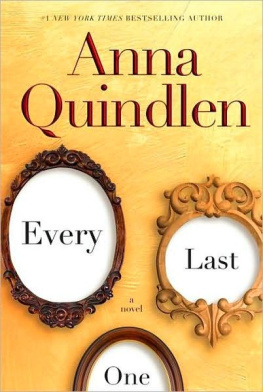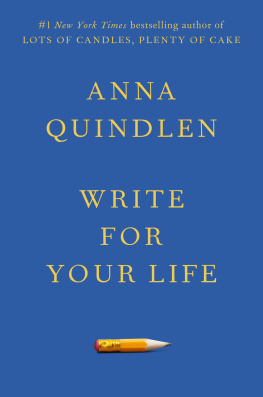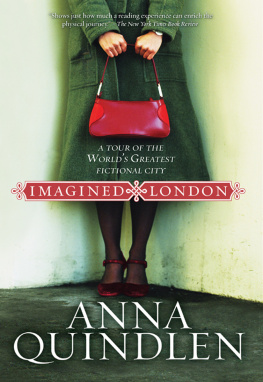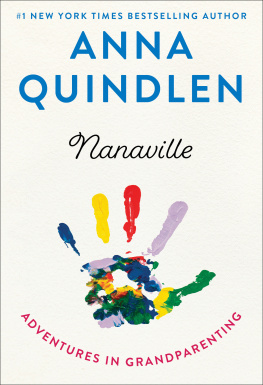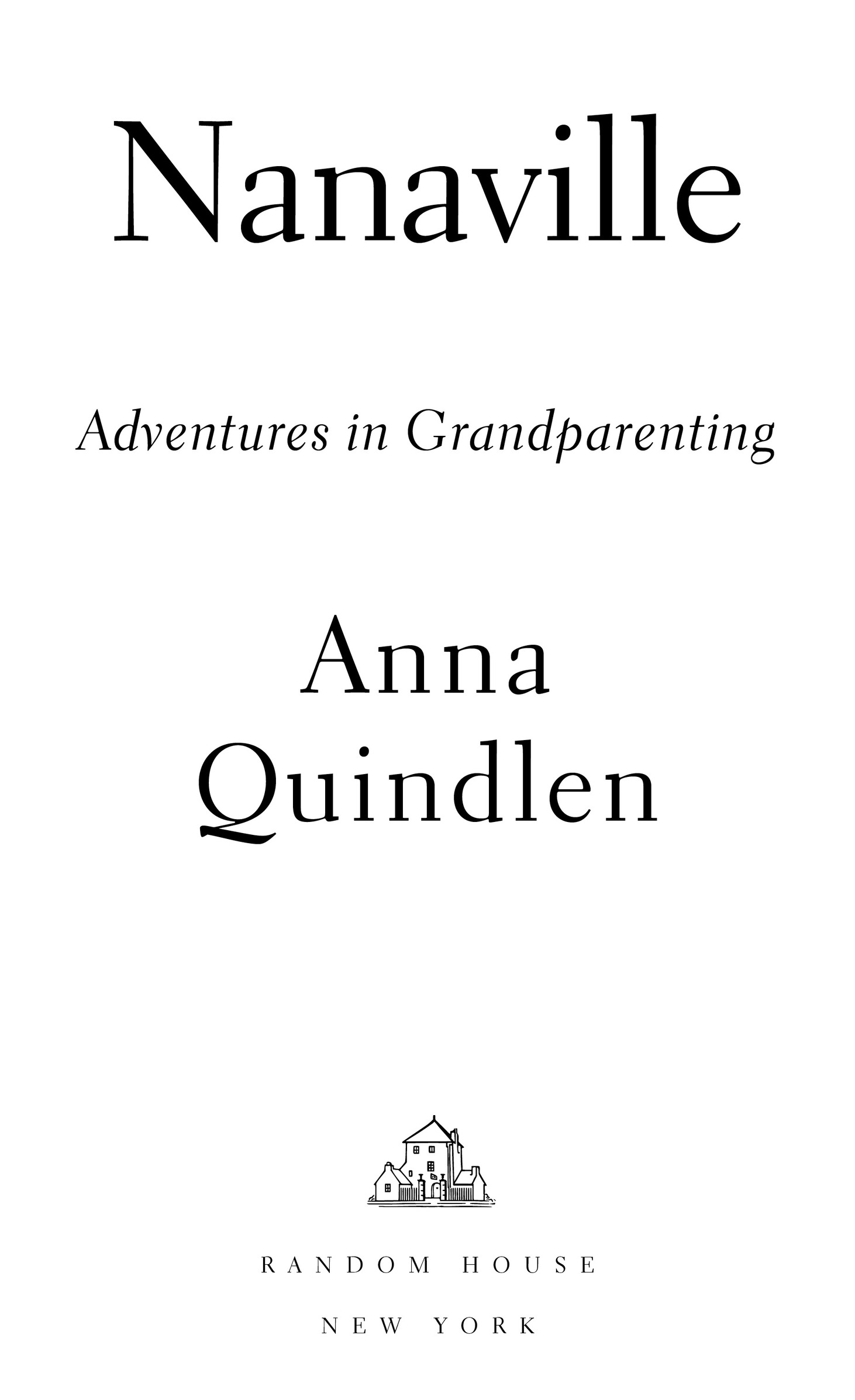Contents
Landmarks
Print Page List
Copyright 2019 by Anna Quindlen
All rights reserved.
Published in the United States by Random House, an imprint and division of Penguin Random House LLC, New York.
R ANDOM H OUSE and the H OUSE colophon are registered trademarks of Penguin Random House LLC.
L IBRARY OF C ONGRESS C ATALOGING-IN- P UBLICATION D ATA
N AMES: Quindlen, Anna, author.
T ITLE: Nanaville / Anna Quindlen.
D ESCRIPTION: New York: Random House, [2019]
I DENTIFIERS: LCCN 2018052184| ISBN 9780812996104 | ISBN 9780812996111 (ebook)
S UBJECTS: LCSH: Quindlen, AnnaFamily. | GrandmothersUnited StatesBiography. | Grandparent and childUnited States.
C LASSIFICATION: LCC PS3567.U336 Z85 2019 | DDC 813/.54 [B]dc23 LC record available at https://lccn.loc.gov/2018052184
Ebook ISBN9780812996111
randomhousebooks.com
Book design by Barbara M. Bachman, adapted for ebook
Cover design: Anna Bauer Carr
Cover photograph: DenisNata/Shutterstock
v5.4
ep
Contents
Sunlight spreads across the checkerboard tiles in the kitchen, and so do many other things: wooden spoons, a rubber frog, Tupperware, a couple of puzzle pieces, some plastic letters, elements of the obstacle course of the active toddler. Did you know that the wheels on the bus go round and round, all through the town? They do, over and over again, sung by the robotic voice of some plastic magnetic thing on the refrigerator. Oh, and Old MacDonald has a farm. The hokey pokey? Thats what its all about.
This soundtrack, I know, will continue into perpetuity, first the nursery song, then the pop song, the rock song, the earworms of motherhood that emanate from the toy radio, the computer, from behind a closed bedroom door with a placard that says PLEASE KNOCK . I have been here before. Sort of.
A little hand rests lightly on my leg, a pale starfish of almost no weight, so that I might not know it was there were I not looking down at it as though it were the Mona Lisa, the Pyramids, the Sistine Chapel ceiling. Look at those fingers! Those tiny pillowy knuckles! When Shakespeare wrote, What a piece of work is man, he must have been looking at a baby, I think to myself, which makes pretty clear that some crazy switch has been flipped in my brain. The wheels on the bus go round and round.
Nana, he says softly, in a high voice that I know from experience will someday be deep and sonorous. But not now. Now it is sweet and light, like something produced by one of the small woodwinds.
Yes, sweetheart, I reply.
Nana, he says again.
Im here.
Nana! This time demanding, slightly petulant. And thats when I notice that he is looking at the fruit bowl on the table and when I realize that he is not crooning my name at all, my new name, of which I am so proud.
He just wants a banana and the full word is too much for him at this moment in his development. Nana denotes a piece of fruit, not this woman who follows him around as though he were a drum major and she a marching band.
These are useful moments, when we are made to understand where we really rate in the topography of family, if we are smart enough to pay attention and humble enough to accept the verdict. I know you dont want to consider this if youre in the same position I am, and I keep hearing that there are people who pay the notion no mind, but we grandparents are secondary characters, supporting actors. We are not the leads. Mama. Daddy. These are the bedrock.
We know this from past experience, our own experience. We were mother and father, most of us, before we became grandmother and grandfather. And because of that it is sometimes hard to accept that we have been pushed slightly to the perimeter. We are now the people whose names come in the smaller print in the movie credits. Its not that we are unimportant, as anyone who has ever had a grandparent knows. After all, secondary characters are what flesh out the plot: what would Great Expectations be without Miss Havisham, or Romeo and Juliet without the nurse? Mrs. Hudson may not get as much time in the stories as Sherlock Holmes does, but a reader is always very happy to have her show up.
The central figures of my childhood were my mother and father, but an essential part of the plot was my pink-skinned grandmother and gruff and demanding grandfather (Quindlen) and my dark and somber grandmother and gentlemanly grandfather (Pantano). They illuminated the story of where I had come from. Arthurs grandfather and I, my daughter-in-laws parents: it will be the same. We provide color, texture, history, mythology. But we are not central.
Mama means Mama. Daddy means Daddy.
But Nana might just be a piece of fruit.
Later on he will be able to say apple and tractor and even, rumor has it, pterodactyl, although at the moment the last is such a welter of undifferentiated consonants that it would take a linguist, or a parent, to figure that out. Soon he has mastered the word banana, and when he does, Nana becomes notably me. Nana, please, he says when he wants something, often something he is not permitted to have. He is always happy to see me. He is not leveled by the leaving. On the evenings when I give him his dinner, his bath, and his bedtime stories, he sometimes cries as I put him in the crib because he realizes this means Im all he has. Mama and Daddy will be home soon, I say, the magic words.
His grandfather is Pop. For a while there was one word: Nanapop. Sometimes there were three: Nanapopgus. Gus is a Labrador retriever. That certainly puts things in perspective, doesnt it?
Its a complicated relationship, being a good grandparent, because it hinges on a series of other relationships. Its an odd combination of being very experienced and totally green: I know how to raise a child, but I need to learn how to help my child raise his own. Where I once commanded, now I need to ask permission. Where I once led, I have to learn to follow. For years I had strong opinions for a living. Now I need to wait until I am asked for them, and modulate them most of the time. Probably I overreact. One day I wrote his parents an email about a school: You should consider this for Arthur. I stared at the sentence and then changed it: You might want to consider this for Arthur. Better to suggest than to command.
Because the kind of grandparent you are is partly determined by the relationship your child has with you, partly determined by the one a son or daughter has with his or her spouse, partly determined by the relationship you have with the person your child has chosen to have a child with.
It is determined by history, too, sometimes by what passed between you and your son and daughter many years ago, the things that have left an afterglow, or a scar. It is often determined by a relationship that most grandparents think they have mastered or at least successfully deconstructed: that is, being a parent. Ah, how we have convinced ourselves that there is no unfinished business, when adding another generation to the great human chain often excavates not so much the future as the past. It is interesting to discover how many people are disconcerted not because their parents are bad grandparents but because they are better grandparents than they were mothers and fathers. Or, as one woman said to me of her father, He never took me to the movies, which might have seemed shabby and small to me had I not once bristled at the news that while my father never once turned the boat around when I was seasick, he was more than willing to do so for his grandchildren.

